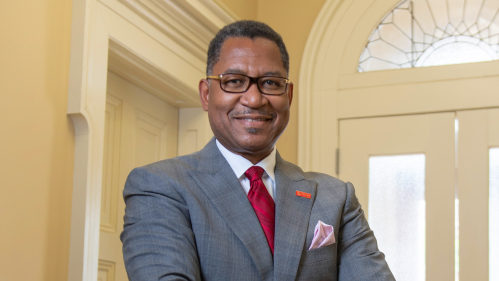Anybody who knew Antonio D. Tillis as a little boy growing up in Memphis, Tennessee, would not be surprised to learn that he is the new chancellor of Rutgers University–Camden. Raised by his maternal grandparents, he was known as the Little Professor because he eagerly came home from school each day and taught his little cousins all the things he had learned. Five years after graduating from Vanderbilt University, Tillis moved to the Dominican Republic to be a Spanish and mathematics instructor in a Christian orphanage. He was a changed man after teaching an 11-year-old boy who had never been to school how to read. “That’s when I knew teaching was going to be my life’s calling,” Tillis says.
Tillis—a scholar of Latin American literature who earned a master’s degree in Spanish from Howard University and a Ph.D. in Latin American literature from the University of Missouri at Columbia—has held faculty and administrative roles in higher education for two decades. Now, he is in a position to have even more of an impact on educating underserved students. Like the two schools at which he worked most recently, the College of Charleston and the University of Houston, Rutgers–Camden caters to students who do not come from privilege, many of them the first in their family to attend college.
If Tillis can help them enroll and earn a degree, “it makes the job not feel like a job.” Tillis, the first in his large family to attend college, wants to expand opportunities for students, many of whom have the additional responsibility of being parents, caregivers, or breadwinners.
“We have a nice smorgasbord of cultural representation,” says Tillis, who has written, edited, or translated several books of Afro-Hispanic literature. “This notion of the beloved community, which will embrace and love and celebrate differences, will make certain there is equal access and equal opportunity. Students will know that the expectation of being a member of such a community is that you thrive irrespective of social economics, irrespective of race, and irrespective of orientation.”
Tillis, who says he has been doing a lot of watching and listening since arriving in July, would like to see students have more internship opportunities and better access to graduate and professional education. And he wants to make sure that the research faculty has the resources it needs. Tillis is particularly impressed by Rutgers–Camden’s community engagement and wants to expand it. Fluent in Spanish, which is the primary language for close to half of the city’s residents, he looks forward to conversing with the families who may have a child attending the university or one considering it. “They see me as an example of what their child can be. That’s very important.”
